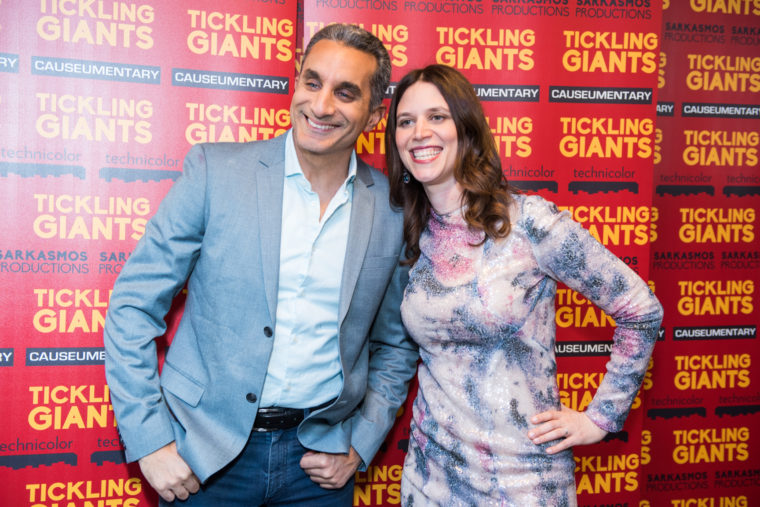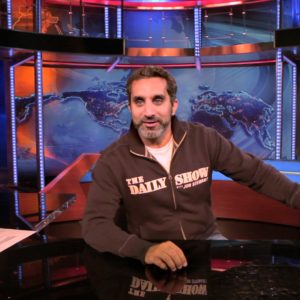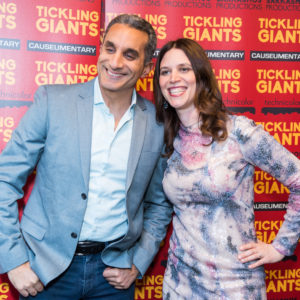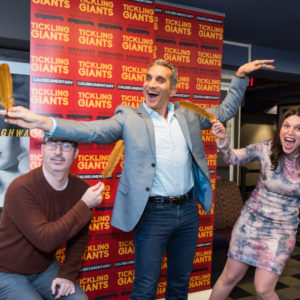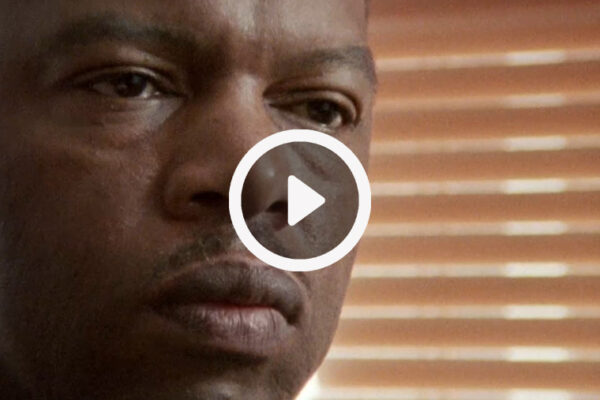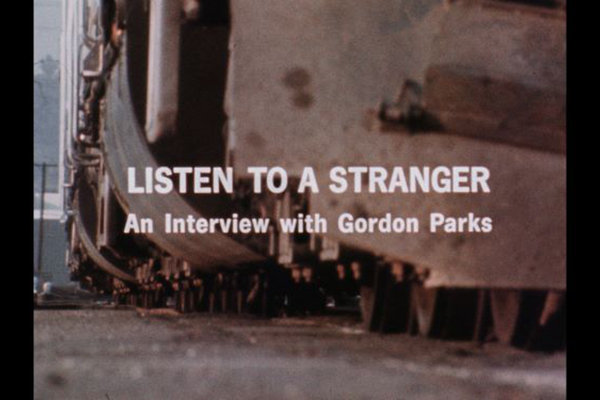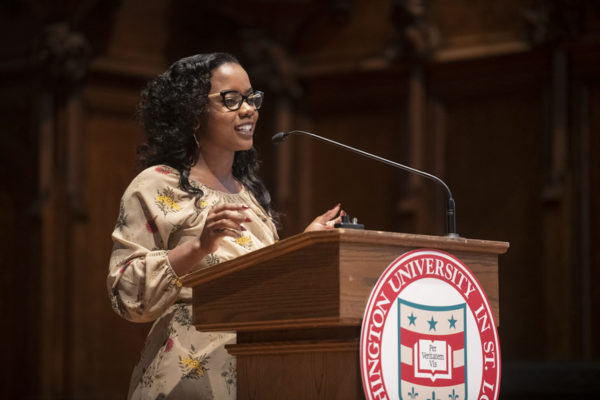Despite majoring in psychology, Sara Taksler, AB ’01 — a senior producer for the satirical news program The Daily Show and a documentary filmmaker — realized at WashU that she wanted to work at the intersection of “entertainment and social justice.” Her latest film, Tickling Giants, about a political satire show in Egypt that was forced off the air, shows exactly how comedy can rattle the halls of power.
Taksler first started thinking about making documentaries after watching War Room — a documentary about Bill Clinton’s presidential campaign — for a media course she was taking. Her first attempt was a 10-minute short about her home state of New Jersey.
“My roommates were from the Midwest and would just tease me endlessly about New Jersey,” Taksler says with a laugh. “They didn’t know they were speaking out of ignorance.” Her film, Stop the Ignorance: The Beauty That Is New Jersey, was “basically my grandpa driving me around the farmland and beautiful spots of central New Jersey,” Taksler says. “I made my roommates watch it until they conceded that New Jersey was in fact beautiful.”
“I really caught the bug about filming things and documenting them [at WashU].”
Sara Taksler, AB '01
When the George W. Bush and Al Gore presidential debate came to campus in 2000, Taksler took a VHS-C camera to the Athletic Complex. After pleading her case, she was allowed to film for a few minutes inside.
“I met a few guys from ABC News, who thought it was funny that I was a kid with a video camera, so they just offered to give me a press pass,” she says. “So for the next few days, I was in heaven.” She was able to interview politicians and celebrities, including Al Franken, Joe Lieberman and Star Jones.
“I really caught the bug about filming things and documenting them then,” she says.
After college, Taksler traveled — one of her first jobs was at a restaurant in Australia that offered free massages to diners — and worked as a freelance production assistant anytime she was back home. In 2003, she landed her first full-time job working as a receptionist for Tough Crowd with Colin Quinn at Comedy Central.
“I really loved the pace of the environment,” Taksler says. “And I became more interested in sticking to that field.”
Around that time, Taksler and her friend Naomi Greenfield, AB ’00, started talking about working on a documentary together. “Neither of our creative interests were being fully satisfied, so we thought we would try to do something on our own,” Taksler says.
Greenfield and Taksler had met at an icebreaker in college. They played a game where everyone introduced themselves and said an interesting fact about themselves — both Greenfield and Taksler could make balloon animals. Balloon tying, specifically the annual balloon-twisting convention Twist & Shout, became the subject of their documentary, Twisted: A Balloonamentary.
“Sara was really good at interviewing people,” says Greenfield. “She had a really good sense while we were interviewing people what direction to take things and what would make for good moments on camera.”
The two worked on the film from 2003 until it premiered at South by Southwest in 2007.
“We were both pretty intense about the experience,” says Greenfield. “We spent every weekend together and travelled all over the place. At the time that we made the film, we were both single and we felt that we had married each other, and the film was our baby.”
For funding, the two crowd-funded before there was such a term. Anyone who donated any amount would get a credit and donors of $100 or more got a photo in the credits. They even auctioned off executive producer rights on eBay.
“We actually received a generous donation from Chancellor Wrighton,” Taksler recalls. “He said that if we needed to purchase Oscar dresses, to come back and maybe he would kick in some more.”
In 2005, while still working on Twisted, Taksler joined The Daily Show with Jon Stewart as a researcher. Now, she’s a senior producer.
“Things change every single day, so you get a real crash course in how to move quickly through a concept or a joke,” she says. “All of that is very useful once you are in a documentary edit, because you’re suddenly dealing with hundreds of hours of footage and you need to have a way to go through that.”
Still though, Taksler was not interested in making another documentary. “I knew how time-consuming it was and how expensive it can be,” she says. “So I was actually very surprised when I had the urge to make another film.”
The idea came to her in 2012 when Bassem Youssef and members of his production crew visited The Daily Show. Youssef was an Egyptian heart surgeon who had risen to fame on YouTube in early 2011. He was helping injured protestors in Tahrir Square during the tumultuous Arab Spring when he and a friend decided to create a political satire show. The B+ Show, as it was called, got 5 million viewers in three months.
Youssef was offered his own TV show, and in August 2011, Al Bernameg (The Show) made its debut. Youssef, heavily inspired by Jon Stewart, decided to film Al Bernameg’s second season in front of a live, unpaid studio audience — the first Middle Eastern show to ever do that. Youssef and his team visited The Daily Show with Jon Stewart in preparation.
All of this, and the fact that Youssef had many women on his production team, piqued Taksler’s curiosity.
“I started to think this could be a good story, but I was scared to go to Egypt,” she says. Taksler asked Youssef if he’d want to be in a documentary. He agreed, but Taksler still hesitated. The U.S. was warning against travel to Egypt. But later that year, when Youssef was brought into court for questioning about jokes he was making, Taksler knew she had to act.
“I felt as if I had an opportunity to tell this important story, and I didn’t want to pass it up just because I was scared,” she says.
She didn’t talk about the documentary on social media for safety reasons, and she used a local crew who would continue filming when she wasn’t there.
During filming, pressure mounted for Al Bernameg — whose viewership had ballooned to 30 million — to shut down. One day, protesters outside the studio were angry enough that armed police officers came. Taksler, who had been filming, couldn’t hold her camera steady because her hands were shaking.
“I was pretty sure I was in over my head,” Taksler says.
She went back inside, where it happened to be someone’s birthday from the show. The crew was celebrating with a Batman cake and singing, even though you could hear the protestors outside.
“There was a lot of ugliness outside, and they were just finding a creative, happy, nonviolent way to live their lives.”
Sara Taksler, AB '01
“It felt like this great moment that, to me, showed what the people in Bassem’s office stood for,” Taksler says. “There was a lot of ugliness outside, and they were just finding a creative, happy, nonviolent way to live their lives.”
Political pressure eventually forced the networks to cancel Youssef’s show in June 2014 after three seasons. Since then, Youssef and his family have moved to California.
In 2015, Taksler, who had finished filming, set up an Indiegogo campaign for funding post-production work. The CEO of Technicolor saw her trailer for Tickling Giants and called Taksler.
“This was shortly after Charlie Hebdo,” Taksler recalls. “The idea of looking at comedy in the Middle East and looking at free speech really spoke to him” since Technicolor is a French-American company. The company offered to executive produce the film.
“I was like, ‘Is this a prank?’” Taksler recalls.
With that and other funding, Taksler was able to debut Tickling Giants in April 2016 at the Tribeca Film Festival. Domestic interest in the film picked up until after the U.S. election.
“At a recent screening, someone in the audience came up to me … and said, ‘This is a cautionary tale for America,'” Taksler has said. “We already are going in some of the directions that the movie shows us in Egypt in terms of limitations on free speech and a free press, and fears about diversity and fears over religion.” But she was careful to end the comparison there.
“We’re certainly not that far down the path,” she said. “And we still have choices to make about what direction we’re going.”
The film is available for sale on Amazon, iTunes and ticklinggiants.com
